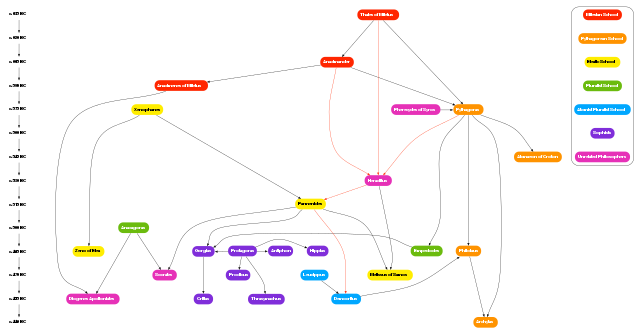
Caption: A chart depicting, crudely of course, the teacher-student relationships (black curves) and oppositional relationships (red curves) between the most prominent Presocratic philosophers.
Click on the image then on the next image to get the legible version.
Features:
- The Presocratics are
vertically located by the approximate dates of their birth.
- The age of the Presocratics
approximately stretches from the birth of
Thales (c.624--c.546 BCE) to the death
of Democritus (c.460--c.370 BCE).
- Archytas (428--347 BCE) is on the chart, but
since he was mostly after Socrates (c.469--399 BCE)
and was a friend of Plato (428/427--348/347 BCE),
he is NOT a Presocratic chronologically.
He was a Pythagorean, and so perhaps is
intellectually a Presocratic.
- What's the distinction between the
Presocratics
and those
Greek philosophers
approximately after
Socrates (c.469--399 BCE)?
There is more of a distinction.
After Socrates, there was a tendency to more specialization. Some Greek philosophers focused---sometimes almost exclusively---on natural philosophy (which can also be called ancient Greek science) and/or ancient Greek mathematics and some, like Socrates, focused---sometimes almost exclusively---on ethics and theology.
It is also true that Presocratics are distinguished by the fact that writings of even the most important ones are lost, except for fragments. This makes them more mysterious and oracular.
Also arguably the Presocratics were more creative, less inhibited by the theories of the mighty dead.
Very importantly, because they came earliest to natural philosophy, Presocratics are fascinating in the history of science as showing how science began: Principium Sapentiae.
See Principium Sapentiae: The Origins of Greek Philosophical Thought (1952) by F.M. Cornford (1874--1943) and W.K.C. Guthrie (1906--1981). It is one of those seminal books that remain readable even though much now has be corrected by later work. Historian of science David Furley (1922--2010) stated it was one of the books that stimulated his research even though it contained much he would disagree with later on (see Fu-164). See Principium Sapientiae: The Origins of Greek Philosophical Thought by F. M. Cornford, W. K. C. Guthrie: Review by: D. A. Rees.
- Socrates (c.469--399 BCE) is on the chart
because he has a dual status.
He counts as a Presocratic because of his early interest in natural philosophy (and because he wrote nothing at all) and he is ex officio a "Socratic philosopher".
Socrates himself:
-
When I was young,
Cebes (c.430--c.350 BCE),
I had a prodigious desire to know that department of
philosophy which is called
the investigation of nature;
to know the causes of things, and why a thing is and is created or destroyed appeared
to me to be a lofty profession; and I was always agitating myself with
the consideration of questions such as these ...
---Socrates (c.469--399 BCE) in the Phaedo of Plato (428/427--348/347 BCE), Benjamin Jowett's (1817--1893) Phaedo translation (1892): (scroll down ∼ 75 % or search on "lofty profession").
Image link: Wikipedia: File:Presocratic graph.svg.
Local file: local link: presocratic_timeline.html.
File: Ancient Astronomy file: presocratic_timeline.html.